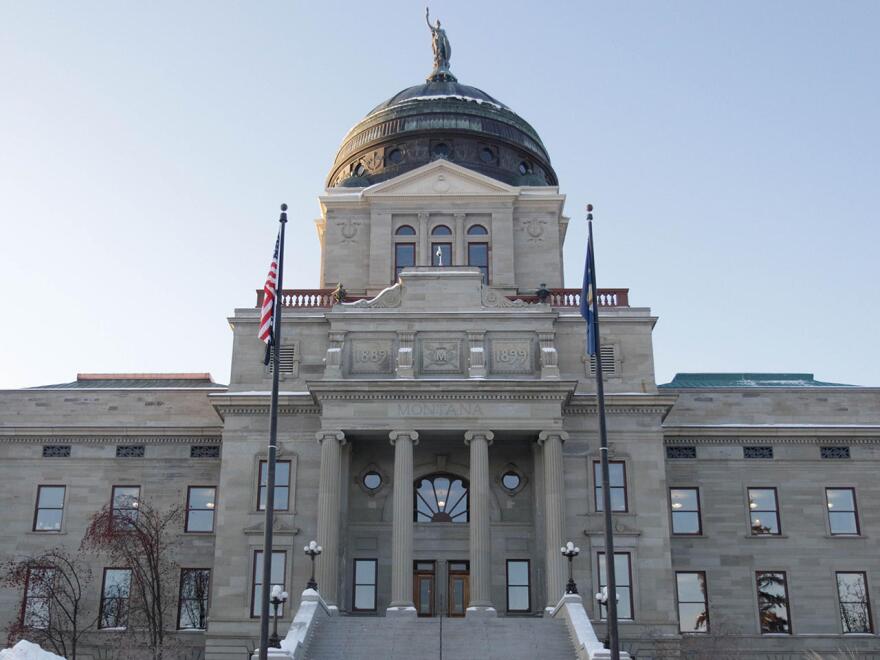Halfway through Montana’s 67th legislative session, Republican lawmakers have worked in concert to pass legislative priorities to send to the desk of the state’s first GOP governor in nearly two decades. But disagreements have emerged over how to pass a balanced budget and how to pay for new substance abuse prevention programs.
Democrats meanwhile have seen few wins this session but have had some success in pushing for expanded telehealth and broadband, and blocking some Republican bills.
Republicans say they got a strong mandate from voters in November and they’re fulfilling those expectations moving longstanding GOP priorities.
Gov. Greg Gianforte says he’s pleased with the progress of the session. He spoke with MTPR about the list of priorities he released during his campaign for governor.
“Our Comeback Plan was, of course, our legislative plan. And many of those components are moving ahead,” Gianforte said.
GOP lawmakers are moving ahead with a handful of tax cut bills critical to Gianforte’s Comeback Plan. Democrats oppose the tax cut proposals, saying the policies don't do enough to help people on low and middle-incomes.
Republicans are also highlighting two bills that Gianforte signed into law that would shield businesses from COVID-19 civil liability and widen where people can carry concealed firearms, including on college campuses.
After picking up 10 seats in the House and Senate and continuing to hold strong majorities, Republican lawmakers have their first chance since 2004 to partner with a governor from their own party to push policies forward. Some, like the recently passed conceal carry bill, follow a trend of Republican lawmakers presenting bills that are nearly identical proposals that were vetoed by former Democratic governors.
Other revived policies include restrictions on abortion and banning sanctuary cities in Montana.
But elsewhere there’s daylight between Gianforte and legislators, notably around proposed substance abuse prevention programs.
Gianforte wants to use new tax revenue on recreational marijuana sales and part of a settlement the state won in a suit against tobacco companies to fund his so-called HEART Fund. It would cost roughly $24 million.
But Republican lawmakers are unsure about that funding formula. Rep. Llew Jones, a Republican from Conrad who also chairs the House Appropriations Committee, says they need to see a vetted policy bill before they give the program money.
“Look, we can’t balance to a ghost. We’re going to have to delay stuff, we’re going to have to pull it out. You get a bill out, we’ll try to align with it to the extent the Legislature agrees with it,” Jones said.
Gianforte has been adamant that he wants to stick to his proposed funding formula.
“There was some shenanigans in the Legislature, where they took some of the money out. But this is the route that legislation goes through on its way to its final conclusion. We hope to put it back in,” Gianforte said.
Lawmakers will focus on hamming out a deal to pass a state budget over the next 45 days.
Adding a wrinkle to that work is a block of moderate Republicans, who in past sessions have aligned with Democrats to reject some of the most conservative policy proposals. This year moderate Republicans voted with Democrats to reject bills to loosen vaccine requirements in Montana, make judge elections partisan and change how labor unions work.
This is how House Minority Leader Kim Abbott frames the session so far: “We’ve stood tall and really showed up to defend against those attacks and we’ve remained laser-focused on our agenda to lift Montanans up.”
Democrats, Gianforte and Republicans found common ground on one policy, and that’s a measure to incentivize increases in starter teacher salaries. That sailed through both chambers.
But Republicans have killed quite a few Democratic proposals, like expanding the Earned Income Tax Credit and raising the state’s minimum wage.
Heading into the session’s second half, only a couple of the 24 bills total Gianforte says are tied to his so-called Montana Comeback Plan have gotten across the finish line, leaving a sizable push.
A lot of that will come down to what those policies cost and how the state will pay for them. Gianforte has said he’d hold the line on state spending. But his proposed budget actually spends more money than it would bring in, which could make for some tough choices.







